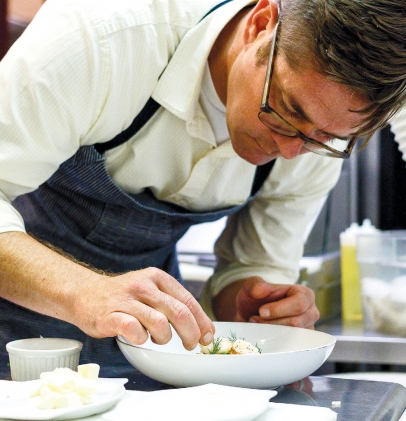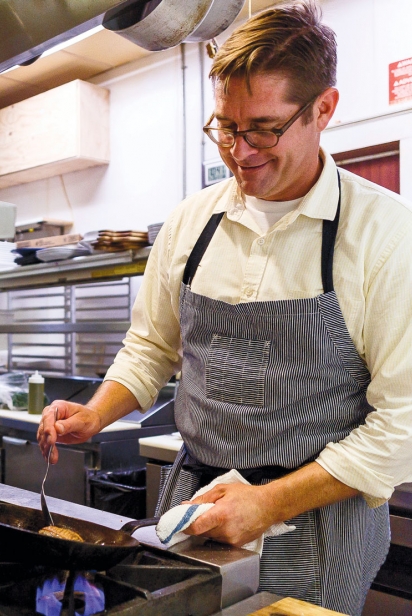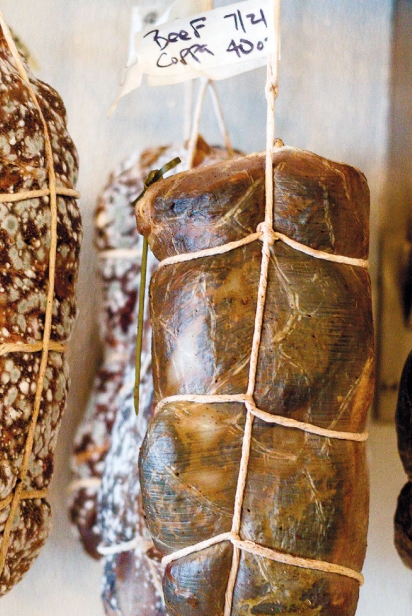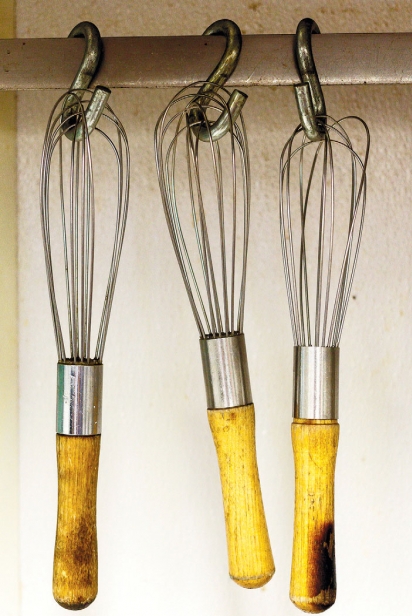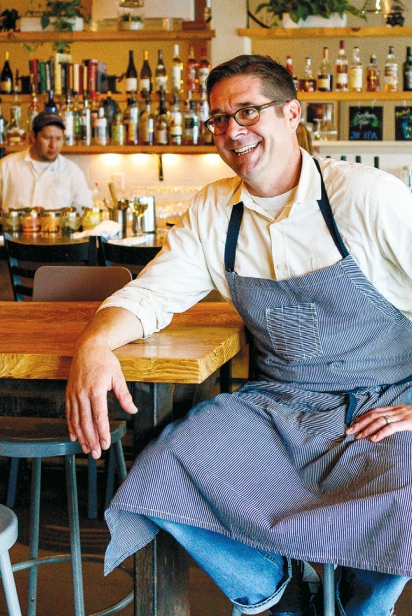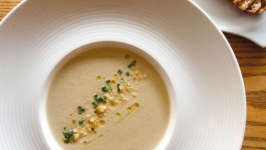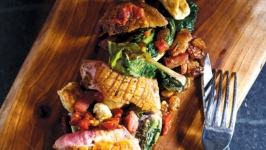Ben Lloyd at the Salted Slate
Chef, Butcher and Chief Bottle Washer: A Chef/Owner’s Multifaceted Endeavors
Many a chef delves into the scientific side of food and cooking. And many a restaurant owner takes a philosophical view of the ups and downs of running a business. But Ben Lloyd, chef-owner of The Salted Slate, comes by both of these traits quite naturally.
From studying biology at the University of Scranton, he slipped into looking at the ways we prepare and cook food. And, from his second major, philosophy, he learned to roll with the punches. Then, after not being accepted to dental school in Boston, he went off to the New England Culinary Institute in Montpelier, Vermont, to try his hand at being a chef.
He has been a very successful one, working at XO and Café Noir for nine years, then with Nick Rabar at 10 Prime Steak and Sushi and finally at Tazza Caffe for three years. When the opportunity to purchase the former Farmstead space from Matt and Kate Jennings came around in 2014, he took the leap and hasn’t looked back.
“It’s been way more rewarding than I thought it would be,” Lloyd says recently, as he cooks up several dishes for Edible Rhody. “It’s also been way more work, but it’s for me, not for somebody else. I thought I couldn’t possibly do more, but ...”
At 41, Lloyd has two young children, 6 and 5, and last year he often brought them with him to work on Wednesday mornings (his wife, Nicole, teaches school).
“You can’t do that if you’re working for someone else,” Lloyd says. “I’ve had customers who’ve told me they are more apt to come here because you have kids here.”
After 18 months of doing double shifts for lunch and dinner, Lloyd finally started taking Sundays off, still feeling responsible, still understanding how hard it is to be the last person out the door at night.
“There’s an expectation from guests that I’ll be here,” he continues. “I’m not just a restaurant owner; I’m a chef who happens to own a restaurant.” And a dedicated, go-for-the-basics kind of chef.
As he prepares a cauliflower bisque and duck breast with kale sprouts and potato gnocchi, Lloyd talks about the hows and whys of his cooking methods.
He has just roasted a pan of cauliflower, fennel, garlic and onion for the bisque and had previously roasted the potatoes that he used to make the gnocchi.
“When you roast those, you’re converting starches into sugars, and flavor-wise, you definitely get more bang for your buck,” he emphasizes.
He adds stock, butter and bay leaves to the roasted veggies and sets it to simmer, even as he begins to heat a skillet for the duck breast. He has pricked and salted the skin of the duck to “get the water out and to give the fat an escape route out of the skin.”
“I don’t marinate meats,” he adds. “I like the flavor of the meat, and I think you mask it and change the internal dynamic of the product when you marinate.”
He starts the duck breast on high heat but brings the temperature down quickly to cook it on the stove top in a long, slow, even process. When he takes the breast out of the skillet, he adds bacon lardons to crisp in the duck fat. Then he will char the greens, add pine nuts and golden raisins and finish the dish with oven-dried tomatoes and duck stock.
The cauliflower bisque has simmered long enough and he drains the stock (chef-style, with his bare hand against the piping hot veggies), measures the stock atop a digital scale that looks like an iPad and then reaches for his Vita-Mix blender.
“As an owner, I worry way more about the equipment,” he says, with a smile.
He adds cream, yogurt and salt to the bisque, and he remarks: “I’m hyperconscious to not have just one note.”
Lloyd is also super conscious about wanting his cooks to understand the systems he uses to prepare the food, so that if he’s not there, they will know how to fix something.
“I try to have everyone get familiar with what we’re doing, with what happens to protein muscle at high heat or at low heat, for example,” he points out. “Some chefs will pre-prep things to take away mistakes from the cooks.”
“I would rather cook Sunday dinner from scratch than a highly textured, overly fussed- over meal,” he continues. “I learn from my cooks as much as they learn from me.”
When Lloyd took over the space two years ago, he took down a wall and put a bar and a few tables into the cheese shop area. The windowed refrigerated corner serves as a meat locker/butcher counter. He’s been somewhat surprised by customers’ responses, all the way from wanting to watch him butcher a pig to being aghast at it.
But Lloyd finds it “empowering” to teach people how to use a whole animal, be it chicken or pig (from Bell & Evans and Pat’s Pastured, respectively). He gets his produce from Little City Growers Co-op, White Barn Farm and a neighborhood tomato grower, as well as from Sid Wainer’s Dartmouth, Massachusetts greenhouse. He gets beef from Blackbird Farm and lamb from Hopkins Southdowns.
As with many young chefs, Lloyd is insatiably curious, always eager to try something new. In his case, that will mean expanding to a second restaurant that he hopes can be “seafood-heavy” and near the water. And he remains philosophical about the path he has chosen.
“As an owner, you never know—on any given night you might have to jump in and start seating or busing tables or fixing plumbing,” Lloyd says. “It’s every position.”
And he thrives on it.
The Salted Slate
186 Wayland Ave., Providence
401.270.3737; SaltedSlate.com


